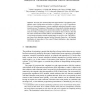Free Online Productivity Tools
i2Speak
i2Symbol
i2OCR
iTex2Img
iWeb2Print
iWeb2Shot
i2Type
iPdf2Split
iPdf2Merge
i2Bopomofo
i2Arabic
i2Style
i2Image
i2PDF
iLatex2Rtf
Sci2ools
126
click to vote
PAKDD
2009
ACM
2009
ACM
Analysis of Variational Bayesian Matrix Factorization
Abstract. Recently, the variational Bayesian approximation was applied to probabilistic matrix factorization and shown to perform very well in experiments. However, its good performance was not completely understood beyond its experimental success. The purpose of this paper is to theoretically elucidate properties of a variational Bayesian matrix factorization method. In particular, its mechanism of avoiding overfitting is analyzed. Our analysis relies on the key fact that the matrix factorization model induces non-identifiability, i.e., the mapping between factorized matrices and the original matrix is not one-to-one. The positivepart James-Stein shrinkage operator and the Marcenko-Pastur law—the limiting distribution of eigenvalues of the central Wishart distribution—play important roles in our analysis.
Bayesian Matrix Factorization | Data Mining | Matrix Factorization | PAKDD 2009 | Probabilistic Matrix Factorization |
Related Content
| Added | 26 Jul 2010 |
| Updated | 26 Jul 2010 |
| Type | Conference |
| Year | 2009 |
| Where | PAKDD |
| Authors | Shinichi Nakajima, Masashi Sugiyama |
Comments (0)

